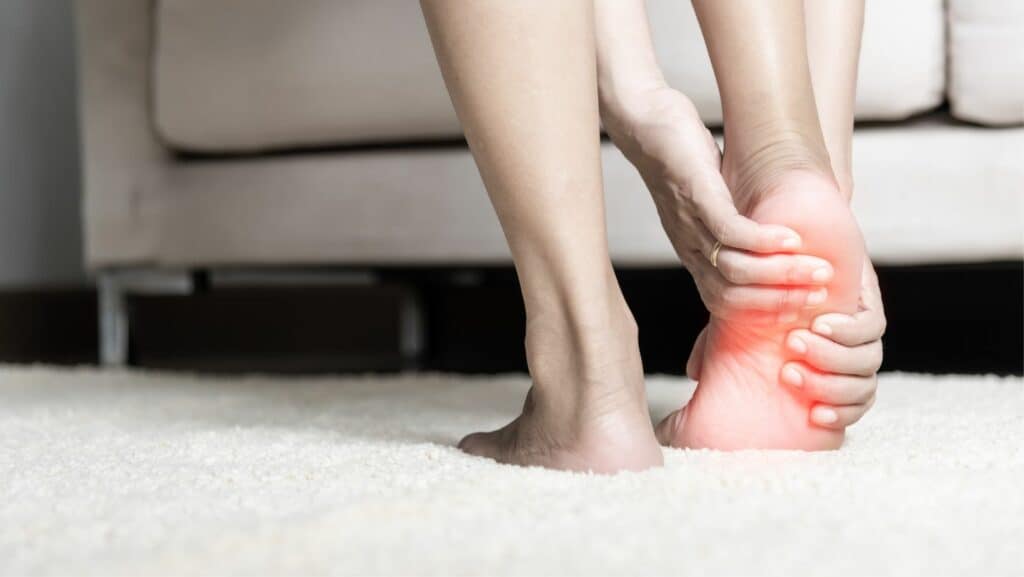Plantar Fasciitis Insoles & Inserts
Read More >
The Plantar Fascia is a thick connective tissue on the underside of your foot, connecting the heel bone to the ball of your foot to provide stability and structure. When standing and walking, the Plantar Fascia is placed under stretch, and if these activities are increased, it can lead to an overload causing Plantar Fasciitis.
Suppose a person has Plantar Fasciitis and continues with a high step count, extended periods on their feet, running or wearing poor footwear. In that case, it can become so painful that your Plantar Fasciitis is too painful to walk on.
Plantar Fasciitis is the most well-known cause of heel pain, but what other conditions can cause pain so bad you can’t walk?

We recommend creating a diary of your pain and your step count. To manage this, record the daily steps and pain levels out of 10 the following morning. If your pain increases, you should reduce your step count until your morning pain is at a more manageable level, i.e. 3-4/10 vas.
This is vital; for most patients, the pain controls their activity levels, whereas getting in control of your pain is essential. Once you identify your step count threshold, maintain this as consistently as possible while working on strengthening and stretching before increasing your average weekly step count by 10-15% each week as pain allows.
If you struggle with this, gait analysis may be required to identify any biomechanical patterns causing you to overload your plantar fascia. Based on the results of this, the correct shoes or insoles can be recommended by your therapist.
Plantar Fasciitis is caused by an overload of the Plantar Fascia and this occurs most often with impact and weight-bearing activities such as walking and running. With that in mind, the likelihood of cycling causing Plantar Fasciitis is low but not impossible. Depending on your position on the bike, such as too low of a saddle height or poorly positioned pedals, excess force may go through the foot and overload the Plantar Fascia. This is more common in spinning classes as people are less familiar with the correct bike setup as opposed to road cycling where one might have had a bike fit.
As cycling is a low-impact activity, it is okay to cycle with Plantar Fasciitis. We would recommend using a stationary bike and doing a steady session keeping the resistance low and cadence high to reduce the amount of force going through the foot. When cycling outside consider a flat route with cleats on. Avoid getting out of the saddle and keep your cadence high.

In extremely irritable cases of Plantar Fasciitis, it may be too painful to walk. In that instance we would recommend the following:

Spikes in walking distance or speed have the potential to cause Plantar Fasciitis but it doesn’t mean you need to stop walking altogether. We recommend frequent short walks of up to 15-20 minutes on a flat surface with supportive footwear. If you stop walking altogether it can dramatically reduce the capacity of the fascia to tolerate impact and this can make it very difficult to return to your previous activity levels once your symptoms have resolved.
Golf as an activity including driving, using irons, and putting does not aggravate Plantar Fasciitis. It is more likely that the overall time on your feet and high step count associated with golf aggravates Plantar Fasciitis.
To play golf with Plantar Fasciitis we recommend using a buggy where possible to reduce the time on your feet as this is a key aggravator of Plantar Fasciitis. If this is not possible, using a trolley rather than carrying your golf bag is preferable as the additional weight of a golf bag can irritate your Plantar Fasciitis.

Jumping, running, and sprinting are some of the key activities that aggravate Plantar Fasciitis, therefore playing Basketball is likely to make the symptoms of Plantar Fasciitis worse. If you have pain with day-to-day activities we would not recommend playing Basketball. However, if you only have mild Plantar Fasciitis pain with sport then consider Plantar Fasciitis taping before you play alongside wearing cushioned trainers. Plantar Fasciitis insoles can reduce your pain playing basketball.

Plantar fasciitis is a frustrating condition, especially if you are an active individual. To maintain your cardiovascular fitness with Plantar Fasciitis we would recommend non-impact cardio exercises such as the elliptical machine, cycling, and swimming. When using the elliptical we recommend wearing supportive, stability trainers. While cycling, keep your cadence high, wear cleats where possible, and stay in the saddle throughout. When swimming, try to avoid tumble turning.
The Plantar Fascia is placed under stress with weight-bearing activities and particularly strained with impact activities. As a result, you should avoid jumping, running, skipping, hopping, and plyometric exercises to reduce the risk of irritating your Plantar Fasciitis.


It is highly unlikely that squats can cause Plantar Fasciitis as it is primarily aggravated by jumping and running.
Low-impact exercises like squats and weightlifting have not been shown in any current literature to be a risk factor for developing Plantar Fasciits.
Plantar Fasciitis is aggravated by activities such as excess time on your feet, walking, and running. The uneven surfaces alongside the undulating surfaces and prolonged time on your feet associated with hiking are likely to make your Plantar Fasciitis worse.
If you do go hiking with Plantar Fasciitis consider wearing stable hiking shoes, applying Plantar fasciitis taping, and taking regular breaks to stretch your Plantar Fascia.

This is not medical advice. We recommend a consultation with a medical professional such as James McCormack. He offers Online Physiotherapy Appointments for £45.
Related Article: Plantar Fasciitis